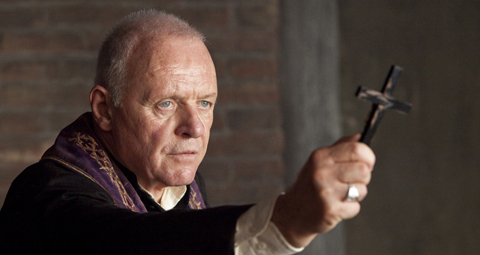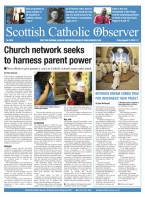September 22 | ![]() 0 COMMENTS
0 COMMENTS ![]() print
print

The insights of an exorcist priest
THE BOW IN THE HEAVENS gives us a rare look at Church investigations of the supernatural — By FR JOHN BOLLAN
Last week I received a phone call asking, ‘Are you still the exorcist?’ I was a little thrown off by the question, but not perhaps as much as you might imagine. What threw me off was the out-of-the-blue nature of the query: fans of Star Wars will recognise my reaction if I say I had a ‘Ben Kenobi moment,’ as the character originally played by Alec Guinness gets called by a name he hasn’t heard for ages.
For indeed I was the exorcist, but a long time ago, almost in a galaxy far, far away—though I always baulked at the title of exorcist.
It was the late and much-missed Bishop Mone who perused my CV and, seeing degrees in spirituality and psychology there, decided that I was the man for the job.
Bishops occasionally get wind of untoward goings-on in the lives or the homes of the faithful in their dioceses, but are usually hard-pressed to know what to do about it. I accepted the ‘job,’ but made it clear that I preferred to see my remit as being an assessor of potentially supernatural occurrences.
Beyond making a diagnosis and a recommendation for future action, I feared that I lacked the gravitas (not to mention the holiness) to take on the full range of tasks entrusted to the Church’s exorcists. I was happy to deal with the ‘early intervention’ stuff, the blessing of houses and persons, even celebrating Mass in troubled homes, but the Max Von Sydow routine would require broader shoulders than mine.
The phone call, about a matter I can’t discuss for obvious reasons, made me wonder if I was still in fact ‘the exorcist.’ I had continued in the role under then-Bishop Philip Tartaglia and I don’t have any notification telling me to stand down, so perhaps I was—or still am—the Assessor of Anomalous Phenomena (believe me, it sounded better in my head). If I have been replaced, it might have been an idea to have a debrief with my successor.
It may strike people as odd to think that, in 2017, people still report feeling menaced by hostile forces, even in those places where they should feel safest. But official statistics from Rome inform us that the services of exorcists are being sought out in ever greater numbers, year on year. And it does seem as though there is something afoot in our supposedly technically advanced, highly sophisticated western world.
For what it’s worth, my experience could be described like this. About a quarter of the cases I was asked to look into were quickly found to be the product of deception. Someone was looking for attention, either from a family member, the Church or, not infrequently, the local council or housing association in the hope of a change of house.
The middle 50 per cent go on a scale from being probably the result of a highly suggestible nature, heavily influenced by an interest in the occult, through to being more plausible, but with enough elements of doubt—perhaps due to mental health issues or drug misuse—to warrant a cautious response.
The remaining quarter have left me in no doubt that there was indeed something very amiss at work in the lives of these people. I have seen and heard things which could not be accounted for other than by the artifice of the most accomplished of conjurors and performers. And, having witnessed the very genuine distress caused by these phenomena, I find it hard to believe that anyone would want to pull off such things as a mere stunt.
Of course, this fascinates a lot of people: I have been pressed for anecdotes, but, beyond generalities, I don’t think it would be fair to say too much.
The mention of mental health issues and drugs is only one of a range of factors which can mimic supernatural goings-on or actually enable them: wherever there is compulsion or addiction —to drugs, alcohol, pornography—there can be a way in for manifestations of the Counter Spirit.
Pope Francis has bemused many folk with his persistent warnings against the wiles of the devil and the risks posed to both mental and spiritual health by dabbling in the occult. I am only too aware that I have parishioners who see no inconsistencies between their Faith and the consulting of fortune tellers or mediums.
The risks are, of course, significant. First of all, there is the risk of deception. We know that there are ways of ‘cold reading’ people so as to elicit all kinds of information from them which can subsequently be used to give the impression that these intimate details are being conveyed from ‘the other side.’
There is a more serious risk, however: the analogy I prefer is one rooted in social media. Whether it’s in a ‘chat room’ or some other way of interacting online, we’re only too aware of the dangers of ‘grooming,’ whereby someone uses a fake profile to draw someone into a dangerous or abusive relationship. Similarly, there’s no guarantee that the ‘someone’ who is coming through is not in fact a ‘something’ pretending to be a loved one.
The bottom line, as prescribed by the Church in her considerable wisdom, is to steer well clear of such things: no ‘hen night’ tarot readings, no messing about with ouija boards, no spiritualist consultations. Otherwise, the diocesan exorcist may be knocking on your door—Heaven forfend.
Thankfully, the other calls I received this week have been more innocuous and grounded in the more joyful side of parish life: among these the Greenock Telegraph wanting to cover the 65th wedding anniversary of parish stalwarts Bobby and Peggy Wilkie, another couple wanting to follow the Wilkies down the path of matrimonial contentment, and someone inquiring if they could take Fr Dan Kamanga, a supply priest from Malawi, out for lunch.
Fr Dan was covering for a couple of days to allow me to make my retreat and squeeze in a few days’ break at the end: he’s such a cheery soul and went down a treat with the regulars.
I was further assisted by Fr Harrity, of the Missionaries of Africa, who made a deanery mission appeal last weekend, and then by my year-mate Fr Vincent Byrne who also filled in for a couple of Masses. Everybody loves Vincent, and with good reason, but not as much as me when he so generously offers to lend a hand.
My retreat is increasingly influenced by Pope Francis. Personally, I make no secret of my preference for the spiritual nourishment provided by our Pope Emeritus Benedict (and visitors to the parish occasionally comment on the frequent appearances of Pope Benedict’s Angelus reflections in the bulletin), but Pope Francis is the successor of Peter now steering the Church’s course.
While Pope Benedict was a gentle Father, Pope Francis is more of a drill sergeant—at least for his priests: his vision of priestly ministry is an exacting one and there are fewer concessions made to the shepherds than the sheep.
But I’ve learned to accept that. St Ignatius of Loyola, the founder of the Jesuits, understood the intimate connection between discipline and discipleship and Pope Francis, a son of Ignatius in so many ways, brings the same apostolic intensity to his speaking and writing about the priesthood.
Whenever I start to get a bit disheartened about how far short I fall of Pope Francis’ criteria for priestly fitness for purpose, I strive to remember his warnings that the Devil’s chief weapon is discouragement. Whether they are official Exorcists or not, every priest is called to cast out the ‘noonday devil’ (Psalm 91:6) of despair and futility from his ministry. And, as Fr Dan, my Malawian stand-in has made abundantly clear, the chief weapon against such a slippery foe is a great big smile which comes from the heart.










